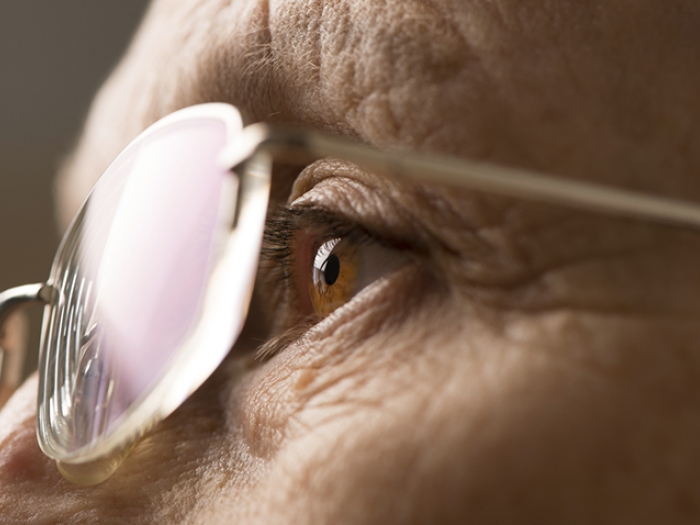AMD affects the eyesight of millions. A Kellogg Eye Center specialist offers easy ways to help slow or prevent the disease.
7:00 AM
Author |

Doctors aren't sure what causes age-related macular degeneration, a disease that affects millions of people in the United States.
LISTEN UP: Add the new Michigan Medicine News Break to your Alexa-enabled device, or subscribe to our daily audio updates on iTunes, Google Play and Stitcher.
Also called AMD, it is known for causing blurred central vision due to damage to the macula — a small area at the back of the eye. Currently, there is no cure.
But there are known risk factors that eye care professionals often use to help determine a patient's likelihood of developing AMD.
A key factor: age. The disease is most likely to occur after age 60, according to the National Eye Institute.
"People who have had more birthdays are the ones who are susceptible," says Julie Rosenthal, M.D., a Kellogg Eye Center retina specialist. It's also more common in women and whites.
MORE FROM MICHIGAN: Sign up for our weekly newsletter
That's why at-risk patients should get regular eye exams that include pupil dilation and further macular degeneration tests, such as an optical coherence tomography (OCT) test.
Other strategies, however, can help slow or possibly prevent severe AMD, notes Rosenthal. She shared healthy habits that can benefit everyone's eye health as they grow older:
Ways to prevent age-related macular degeneration:
1. Quit smoking
"Rules 1, 2 and 3 are stop smoking," says Rosenthal. Smoking may double a person's risk of developing AMD. And the habit exposes you to dangerous free radicals, unstable molecules that can cause cellular damage and keep nutrients from reaching the retina. The sooner you can quit, the better.
2. Know your family history
People with a first-degree relative affected by AMD have a much greater risk of developing it, too. Those with family ties to the disease should be vigilant for potential symptoms that include difficulty recognizing faces, struggling to adapt to low light and seeing straight lines that appear wavy.
SEE ALSO: Impaired Vision? Create a Fall Prevention Plan with These Tips
3. Eat leafy greens
Load up your plate with spinach, kale and Swiss chard, among other green veggies. "They have a lot of antioxidant vitamins," Rosenthal says. Those nutrients help protect against cellular damage from free radicals, which can contribute to eye disease.
4. Take supplements
Patients with deficient diets might consider multivitamins. And people at risk of advanced AMD should ask their doctor about a specialized blend of supplements known as AREDS. The macular degeneration vitamins are "not a treatment or cure but can decrease your risk of getting the more severe forms of AMD," Rosenthal says.
5. Wear sunglasses
Such eyewear offers protection from UV and blue light that can cause retinal damage from repeat exposure (the American Macular Degeneration Foundation recommends wearing a pair with a "UV 400" label). "Lifetime use is probably helpful," Rosenthal says.
SEE ALSO: Watch Out for These 5 Summer Eye Dangers
6. Maintain a healthy blood pressure and weight
Poor blood circulation due to hypertension can also restrict blood flow to the eyes, thus contributing to AMD. Losing weight is a proven way to lower blood pressure; even small gains help — especially if you already have hypertension.
7. Test yourself with an Amsler grid
The tool that helps doctors detect vision problems related to macular damage can be used at home. If, after staring at the paper grid, you notice that the central part of your vision in one eye has become darker or the grid lines are wavy, call your doctor. Keep your Amsler grid in a place that reminds you to check it daily.

Explore a variety of health care news & stories by visiting the Health Lab home page for more articles.

Department of Communication at Michigan Medicine
Want top health & research news weekly? Sign up for Health Lab’s newsletters today!





